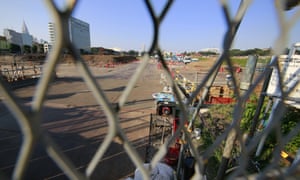The governor of Tokyo, Yuriko Koike, is heading for a confrontation with the International Olympic Committee and the organisers of the 2020 Olympics over a warning that the Games could cost 3tn yen (£23bn) – four times the original estimate – and a proposal to cancel the construction of three new venues.
A panel of independent experts formed by Koike to review venues and costs recently proposed renovating existing venues in Tokyo for volleyball and swimming, and moving the rowing and canoe sprint several hundred miles from the capital.
But the head of the International Rowing Federation, Jean-Christophe Rolland, said he was disappointed by the prospect of the venue being moved from Tokyo Bay to the city of Tome in Miyagi, one of three prefectures that were hit hard by the March 2011 earthquake and tsunami.
Rolland suggested the rowing event should be held, as originally planned, at the Umi no Mori (Sea Forest) venue. “I was very surprised … to hear about a possible change and, not to say more, a little bit disappointed,” he told reporters in Tokyo. “We made a full in-depth review of all the possibilities, and the outcome of this is that the Sea Forest is the best solution.
“For me, there is no doubt this is absolutely suitable for the sport of rowing.”
The Tokyo government panel suggested the venue changes after warning that the total cost of the 2020 Games could rise to four times the original estimate of 734bn yen, made when it won the bid in 2013. The 2012 Olympics in London cost £8.8bn.
The rising price tag for the Tokyo Games has been blamed on higher labour and materials costs that have resulted from vast reconstruction projects in the area of north-east Japan that was destroyed by the 2011 disaster.
The panel’s head, Shinichi Ueyama, said newly built permanent facilities risked lying unused after the Games due to Japan’s falling population and ageing society. “Naturally, anyone who hears these numbers is alarmed,” Ueyama said.

Koike, who became Tokyo’s first female governor in July, has promised to cut wasteful spending and identified the Olympics as one area in which savings could be made.
“We cannot impose the negative legacy [of white elephant Olympic venues] on to Tokyo residents,” Koike told reporters after the panel’s report was released. “We need to consider other options, such as using temporary facilities, rather than constructing permanent ones.”
The Tokyo 2020 organising committee faces a nervous wait until Koike decides whether to adopt the panel’s recommendations, but its president, the former prime minister Yoshiro Mori, has criticised the proposed venue moves, which would require the approval of the three sports’ respective international federations and the IOC.
“At this point, it would be extremely difficult to turn everything upside down from the Japanese side,” Mori said.
Hiroshi Sato, the vice-director general of the organising committee, said he and his colleagues were “embarrassed and surprised” by the prospect of changing three venues at such a late stage in the Olympic preparations.
The latest cost estimate for the rowing and canoeing venue is 49bn yen, seven times higher than the initial forecast. The panel suggested the event be moved to the Naganuma course in Tome, about 270 miles (440km), north-east of Tokyo.
Any further venue changes would call into question Tokyo’s promise to put on a “compact” Games, with 28 of the 31 competition venues within a five-mile radius of the Olympic village.
The row over venue changes and rising costs is the latest in a series of setbacks to have plagued preparations for Japan’s first summer Olympics since Tokyo 1964, an event credited with ending the country’s postwar pariah status and kickstarting rapid economic development.
The original design for the main stadium was scrapped after complaints about its size and cost. A replacement has been approved, but the new stadium will not be ready in time to host the final of the 2019 Rugby World Cup, as tournament organisers had originally planned.
Tokyo 2020 organisers also had to replace the Games’ logo after the designer of the original emblem was accused of plagiarism.
In May, the Guardian revealed that the Tokyo 2020 bid committee had paid more than US$2m (£1.6m) to a company linked to the son of the disgraced former world athletics chief, Lamine Diack, in return for advice on how to present a winning bid.
A Japanese investigation recently cleared officials who led Tokyo’s bid of any illegal activity, but French prosecutors have yet to complete their investigation into the payments.



